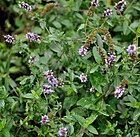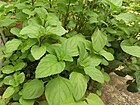Note: This is a project under development. The articles on this wiki are just being initiated and broadly incomplete. You can Help creating new pages.
Difference between revisions of "Mentha piperata"
| Line 1: | Line 1: | ||
| − | + | [[File:Mentha piperata-1-hrs-yercaud-salem-India.jpg|thumb|right|''Mentha piperata'']] | |
| + | '''Peppermint''' (Mentha × piperita, also known as Mentha balsamea Wild.) is a hybrid mint, a cross between watermint and spearmint. Indigenous to Europe and the Middle East, the plant is now widely spread and cultivated in many regions of the world. It is occasionally found in the wild with its parent species. | ||
==Uses== | ==Uses== | ||
| − | {{Uses|}}, {{Uses|}}, {{Uses|}}, {{Uses|}}, {{Uses|}}, {{Uses| | + | {{Uses|Flatulence}}, {{Uses|Menstrual pains}}, {{Uses|Diarrhea}}, {{Uses|Nausea}}, {{Uses|Depression-related anxiety}}, {{Uses|Muscle and nerve pain}}. |
==Parts Used== | ==Parts Used== | ||
| − | {{Parts Used| | + | {{Parts Used|Leaves}}. |
==Chemical Composition== | ==Chemical Composition== | ||
| + | piperita L., were identified. Its major constituents were menthol (46.32%), menthofuran (13.18%), menthyl acetate (12.10%), menthone (7.42%), and 1.8-cineole (6.06%) | ||
<ref name="chemical composition"/> | <ref name="chemical composition"/> | ||
==Common names== | ==Common names== | ||
| − | {{Common names | + | {{Common names|kn=ಮೆರುಗು Merugu|ml=കര്പ്പൂരത്തുളസി Karppoora-Tulasi|sa=|ta=புதீனா Pudina|te=మిరియాల ద్రావకము Miriyala dravakamu|hi=विलायती पुदीना Vilayati pudina, पेपरमिंट Peppermint|en=Peppermint}} |
==Properties== | ==Properties== | ||
Reference: Dravya - Substance, Rasa - Taste, Guna - Qualities, Veerya - Potency, Vipaka - Post-digesion effect, Karma - Pharmacological activity, Prabhava - Therepeutics. | Reference: Dravya - Substance, Rasa - Taste, Guna - Qualities, Veerya - Potency, Vipaka - Post-digesion effect, Karma - Pharmacological activity, Prabhava - Therepeutics. | ||
===Dravya=== | ===Dravya=== | ||
| + | |||
===Rasa=== | ===Rasa=== | ||
| − | |||
===Guna=== | ===Guna=== | ||
| − | |||
===Veerya=== | ===Veerya=== | ||
| Line 29: | Line 30: | ||
==Habit== | ==Habit== | ||
| − | {{Habit|}} | + | {{Habit|Herb}} |
==Identification== | ==Identification== | ||
===Leaf=== | ===Leaf=== | ||
| − | {{Leaf|||}}<ref name="Leaf"/> | + | {{Leaf|Simple|oblong-elliptical to lanceolate|The leaves can be 4–9 cm (1.6–3.5 in) long and 1.5–4 cm (0.59–1.57 in) broad. They are dark green with reddish veins, and they have an acute apex and coarsely toothed margins}}<ref name="Leaf"/> |
===Flower=== | ===Flower=== | ||
| − | {{Flower||||}} | + | {{Flower|Unisexual| 6–8 mm (0.24–0.31 in) long|purple||four-lobed corolla about 5 mm (0.20 in) diameter; they are produced in whorls (verticillasters) around the stem, forming thick, blunt spikes. Flowering season lasts from mid- to late summer.}} |
| − | |||
| − | |||
===Other features=== | ===Other features=== | ||
| Line 46: | Line 45: | ||
==Where to get the saplings== | ==Where to get the saplings== | ||
| − | |||
==Mode of Propagation== | ==Mode of Propagation== | ||
| − | {{Propagation|}} | + | {{Propagation|Seeds}}. |
==How to plant/cultivate== | ==How to plant/cultivate== | ||
| + | Peppermint generally grows best in moist, shaded locations, and expands by underground rhizomes. Young shoots are taken from old stocks and dibbled into the ground about 1.5 feet apart. They grow quickly and cover the ground with runners if it is permanently moist. | ||
<ref name="How to plant/cultivate"/> | <ref name="How to plant/cultivate"/> | ||
==Commonly seen growing in areas== | ==Commonly seen growing in areas== | ||
| − | {{Commonly seen| | + | {{Commonly seen|grasslands}}. |
==Photo Gallery== | ==Photo Gallery== | ||
<gallery class="left" caption="" widths="140px" heights="140px"> | <gallery class="left" caption="" widths="140px" heights="140px"> | ||
| − | + | File:Pfefferminze Mentha piperata.jpg | |
| + | File:Mentha piperata Peppermint ბაღის პიტნა.JPG | ||
| + | File:Mentha piperata-1-hrs-yercaud-salem-India.jpg | ||
</gallery> | </gallery> | ||
==References== | ==References== | ||
<references> | <references> | ||
| − | + | <ref name="chemical composition">[https://www.ncbi.nlm.nih.gov/pmc/articles/PMC5527698/#:~:text=Chemical%20composition,-The%20studied%20EO&text=piperita%20L.%2C%20were%20identified.,6.06%25)%20%5BTable%201%5D. "sciencedirect"]</ref> | |
| − | <ref name="chemical composition">[" | + | <ref name="Leaf">[https://en.wikipedia.org/wiki/Peppermint "wayback machine"]</ref> |
| − | + | <ref name="How to plant/cultivate">[https://en.wikipedia.org/wiki/Peppermint "Cultivation of Mentha"]</ref> | |
| − | <ref name="Leaf">[" | ||
| − | |||
| − | <ref name="How to plant/cultivate">[ "Cultivation"] | ||
| − | |||
</references> | </references> | ||
==External Links== | ==External Links== | ||
| − | * [ ] | + | * [https://www.botanical-online.com/en/botany/peppermint-characteristics Mentha piperata] |
| − | + | ||
| − | |||
[[Category:Herbs]] | [[Category:Herbs]] | ||
| − | [[Category: | + | [[Category:Lamiaceae]] |
Revision as of 15:02, 4 June 2020
Peppermint (Mentha × piperita, also known as Mentha balsamea Wild.) is a hybrid mint, a cross between watermint and spearmint. Indigenous to Europe and the Middle East, the plant is now widely spread and cultivated in many regions of the world. It is occasionally found in the wild with its parent species.
Contents
- 1 Uses
- 2 Parts Used
- 3 Chemical Composition
- 4 Common names
- 5 Properties
- 6 Habit
- 7 Identification
- 8 List of Ayurvedic medicine in which the herb is used
- 9 Where to get the saplings
- 10 Mode of Propagation
- 11 How to plant/cultivate
- 12 Commonly seen growing in areas
- 13 Photo Gallery
- 14 References
- 15 External Links
Uses
Flatulence, Menstrual pains, Diarrhea, Nausea, Depression-related anxiety, Muscle and nerve pain.
Parts Used
Chemical Composition
piperita L., were identified. Its major constituents were menthol (46.32%), menthofuran (13.18%), menthyl acetate (12.10%), menthone (7.42%), and 1.8-cineole (6.06%) [1]
Common names
| Language | Common name |
|---|---|
| Kannada | ಮೆರುಗು Merugu |
| Hindi | विलायती पुदीना Vilayati pudina, पेपरमिंट Peppermint |
| Malayalam | കര്പ്പൂരത്തുളസി Karppoora-Tulasi |
| Tamil | புதீனா Pudina |
| Telugu | మిరియాల ద్రావకము Miriyala dravakamu |
| Marathi | NA |
| Gujarathi | NA |
| Punjabi | NA |
| Kashmiri | NA |
| Sanskrit | |
| English | Peppermint |
Properties
Reference: Dravya - Substance, Rasa - Taste, Guna - Qualities, Veerya - Potency, Vipaka - Post-digesion effect, Karma - Pharmacological activity, Prabhava - Therepeutics.
Dravya
Rasa
Guna
Veerya
Vipaka
Karma
Prabhava
Habit
Identification
Leaf
| Kind | Shape | Feature |
|---|---|---|
| Simple | oblong-elliptical to lanceolate | The leaves can be 4–9 cm (1.6–3.5 in) long and 1.5–4 cm (0.59–1.57 in) broad. They are dark green with reddish veins, and they have an acute apex and coarsely toothed margins |
Flower
| Type | Size | Color and composition | Stamen | More information |
|---|---|---|---|---|
| Unisexual | 6–8 mm (0.24–0.31 in) long | purple | four-lobed corolla about 5 mm (0.20 in) diameter; they are produced in whorls (verticillasters) around the stem, forming thick, blunt spikes. Flowering season lasts from mid- to late summer. |
Other features
List of Ayurvedic medicine in which the herb is used
Where to get the saplings
Mode of Propagation
How to plant/cultivate
Peppermint generally grows best in moist, shaded locations, and expands by underground rhizomes. Young shoots are taken from old stocks and dibbled into the ground about 1.5 feet apart. They grow quickly and cover the ground with runners if it is permanently moist. [3]
Commonly seen growing in areas
Photo Gallery
References
External Links
- Ayurvedic Herbs known to be helpful to treat Flatulence
- Ayurvedic Herbs known to be helpful to treat Menstrual pains
- Ayurvedic Herbs known to be helpful to treat Diarrhea
- Ayurvedic Herbs known to be helpful to treat Nausea
- Ayurvedic Herbs known to be helpful to treat Depression-related anxiety
- Ayurvedic Herbs known to be helpful to treat Muscle and nerve pain
- Herbs with Leaves used in medicine
- Herbs with common name in Kannada
- Herbs with common name in Hindi
- Herbs with common name in Malayalam
- Herbs with common name in Tamil
- Herbs with common name in Telugu
- Herbs with common name in English
- Habit - Herb
- Index of Plants which can be propagated by Seeds
- Herbs that are commonly seen in the region of grasslands
- Herbs
- Lamiaceae



